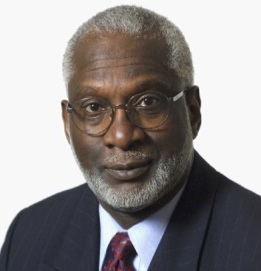 David Satcher, M.D., Ph.D. FAAFP, FACPM, FACP (born March 2, 1941) is an American physician, and public health administrator. He was a four-star admiral in the United States Public Health Service Commissioned Corps and served as the 10th Assistant Secretary for Health, and the 16th Surgeon General of the United States.
David Satcher, M.D., Ph.D. FAAFP, FACPM, FACP (born March 2, 1941) is an American physician, and public health administrator. He was a four-star admiral in the United States Public Health Service Commissioned Corps and served as the 10th Assistant Secretary for Health, and the 16th Surgeon General of the United States.
Satcher was born in Anniston, Alabama. At the age of two, he contracted whooping cough. A black doctor, Jackson, came to his parents’ farm, and told his parents he didn’t expect David to live, but nonetheless spent the day with him, and told his parents how to give him the best chance he could. Satcher said that he grew up hearing that story, and that inspired him to be a doctor.
Satcher graduated from Morehouse College in Atlanta in 1963 and was elected to Phi Beta Kappa. He received his M.D. and Ph.D. in Cell Biology from Case Western Reserve University in 1970 with election to Alpha Omega Alpha Honor Society. He completed residency/fellowship training at the Strong Memorial Hospital, University of Rochester, UCLA School of Medicine, and Martin Luther King Jr.-Harbor Hospital. He is a fellow of the American Academy of Family Physicians, the American College of Preventive Medicine, and the American College of Physicians, and is Board Certified in Preventive Medicine. Satcher pledged Omega Psi Phi fraternity and is an initiate at the Psi Chapter of Morehouse College.
Satcher has served as professor and Chairman of the Department of Community Medicine and Family Practice at Morehouse School of Medicine from 1979 to 1982. He is a former faculty member of the UCLA School of Medicine, the UCLA School of Public Health, and the King-Drew Medical Center in Los Angeles, where he developed and chaired the King-Drew Department of Family Medicine. From 1977 to 1979, he served as the interim Dean of the Charles R. Drew Postgraduate Medical School, during which time, he negotiated the agreement with UCLA School of Medicine and the Board of Regents that led to a medical education program at King-Drew. He also directed the King-Drew Sickle Cell Research Center for six years. Satcher served as President of Meharry Medical College in Nashville, Tennessee, from 1982 to 1993. He also held the posts of Director of the Centers for Disease Control and Prevention and Administrator of the Agency for Toxic Substances and Disease Registry from 1993 to 1998.
Satcher served simultaneously in the positions of Surgeon General and Assistant Secretary for Health from February 1998 through January 2001 at the US Department of Health and Human Services. As such, he is the first Surgeon General to be appointed as a four-star admiral in the PHSCC, to reflect his dual offices.
In his first year as Surgeon General, Satcher released the 1998 Surgeon General’s report, “Tobacco Use Among U.S. Racial/Ethnic Minority Groups.” In it he reported that tobacco use was on the rise among youth in each of the country’s major racial and ethnic groups threatening their long-term health prospects.
Satcher was appointed by Bill Clinton, and remained Surgeon General until 2002, contemporaneously with the first half of the first term of President George W. Bush’s administration. Eve Slater would later replace him as Assistant Secretary for Health in 2001. Because he no longer held his dual office, Satcher was reverted and downgraded to the grade of vice admiral in the regular corps for the remainder of his term as Surgeon General. In 2001, his office released the report, The Call to Action to Promote Sexual Health and Responsible Sexual Behavior. The report was hailed by the chairman of the American Academy of Family Physicians as an overdue paradigm shift—”The only way we’re going to change approaches to sexual behavior and sexual activity is through school. In school, not only at the doctor’s office.” However, conservative political groups denounced the report as being too permissive towards homosexuality and condom distribution in schools. When Satcher left office, he retired with the rank of vice admiral.
He is the recipient of many honorary degrees and numerous distinguished honors, including the Public Health Service Distinguished Service Medal, the 2013 UC Berkeley School of Public Health Public Health Heroes Award, an honorary Doctor of Science from Harvard University (2011), and top awards from the American Medical Association, the American College of Physicians, the American Academy of Family Physicians, and Ebony magazine. In 1995, he received the Breslow Award in Public Health and in 1997 the New York Academy of Medicine Lifetime Achievement Award. In 2004, he received the Benjamin E. Mays Trailblazer Award and the Jimmy and Rosalynn Carter Award for Humanitarian Contributions to the Health of Humankind from the National Foundation for Infectious Diseases. An academic society at the Case Western School of Medicine is named in Dr. Satcher’s honor, and, in 2009, he delivered the university’s Commencement Address.
